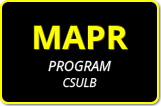MAPR Prerequisite Course Descriptions

PSY 310 – Intermediate Statistics
Basic theoretical concepts of statistics and use of these concepts in selection and development of model testing, hypothesis testing and parameter estimation procedures. Both single measure (univariate) and correlation (bivariate) concepts are included.
*Note: Applicants must have 2 semesters or 3 quarters of statistical coursework.
One of the following five courses:
PSY 351 – Social Psychology
Study of individuals and groups as they are affected by social interactions. Topics may include social cognition, attitudes and persuasion, social influence, interpersonal perception and attraction, aggression, altruism, and group dynamics.
or
PSY 356 – Personality
Survey of classical theories and methods in Personality psychology, with a sampling of current research. Examines how and why people differ in personality, and the ways these differences are reflected in thoughts, feelings, motivations, and behaviors.
or
PSY 361 – Psychology of Child and Adolescent Development
Developmental change processes from prenatal development through adolescence. Emphasis on ethnic, gender, and social class differences in development combined with emphasis on the universal features of human development. Topic coverage includes physical-motor, social, physiological, and cognitive aspects of development.
or
PSY 363 – Developmental Psychopathology
Research on psychiatric disorders of children and adolescents from a developmental perspective. The symptoms, causes, course and prevention of the most important childhood disorders are discussed, including conduct disorder, attention deficit hyperactivity, depression, anxiety disorder, autism and mental retardation.
or
PSY 365 – Development: Emerging Adulthood to Aging
Methodological and theoretical problems and issues in the study of developmental change processes from young adulthood through old age. Topical coverage includes physical-motor, social, physiological and intellectual aspects of behavioral functioning.
Two courses from the following three sections. Each course must be from a different section.
Section 1:
PSY 331 – Sensation and Perception
Introduction to the scientific study of sensory processes and perceptual principles from a psychophysical and physiological perspective, and the methods used to investigate them. Topics may include vision, audition, psychophysics, and object and space perception.
or
PSY 332 – Human Cognition
Study of higher-order processes basic to the acquisition of knowledge. Includes thinking, problem solving, creativity, information processing, decision making, judgment, concepts and imagination.
or
PSY 333 – Psychology of Learning
Learning is a relatively permanent change in behavior resulting from experience. Emphasizes interaction of biological and environmental variables in the processes of instinct, habituation, sensitization, Pavlovian conditioning, instrumental learning, and cognition; examination of methods, theory and applications.
Section 2:
PSY 336 – Psychology of Emotion
Discussion of research and theories of emotions. Includes the evolution of emotions, neurophysiological mechanisms of emotion, development of emotions, expressions of emotions, and emotions in social relationships, with an emphasis on the emotions of anger, grief, happiness, jealousy, and love.
or
PSY 337 – Psychology of Happiness
Examines research in human happiness. Topics include: Assessing happiness, the adaptive function of positive emotions, the relation between wealth and happiness, personality characteristics of happy individuals, international differences in happiness, and strategies for enhancing the happiness of individuals.
or
PSY 378 – Health Psychology
Research and theory regarding attitudes, beliefs, and behaviors related to health and illness. Individual difference variables will be examined. Analysis of applications of psychology to prevention, counseling, and treatment of major health problems.
or
PSY 379 – Psychology of Stress
Introduction to the scientific study of stress and its relationship to health. Course content will focus on understanding the nature of psychological stress, its physiological correlates, and specific strategies used to help in understanding and managing our own experience of stress.
Section 3:
PSY 340 – Physiology of Behavior
An in-depth examination of central nervous system (CNS) components that create our behavioral capabilities. Topics include major structural and functional features of the neuron and of selected systems representative of the sensory, integrative, and motor capabilities of the CNS.
or
PSY 341 – Neuropsychology
Localization of brain regions responsible for human capabilities as studied in patients with brain damage, normal people, and nonhumans. How brain damage is assessed and treated. Relation of findings to function of normal brains.
or
PSY 342 – Psychopharmacology
Introduction to the effects of major classes of psychoactive drugs on the central nervous system. Topics include anatomical and functional characteristics of neurotransmitter systems; pharmacology of drug administration; and physiological and psychological actions of selected classes of psychoactive drugs.
Important: If accepted to the MAPR program, any missing prerequisite course must be completed by the end of your first semester in the program.
